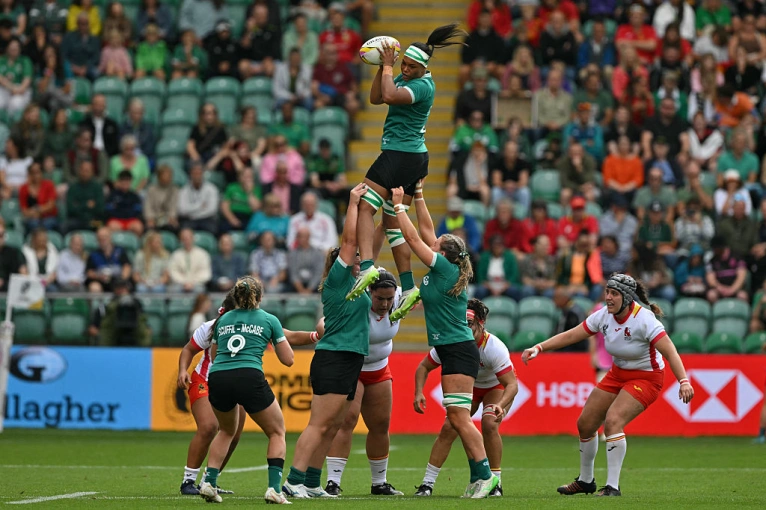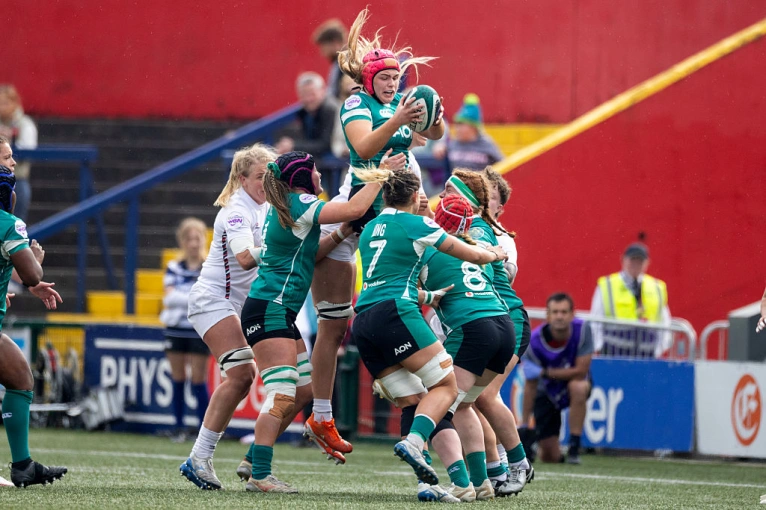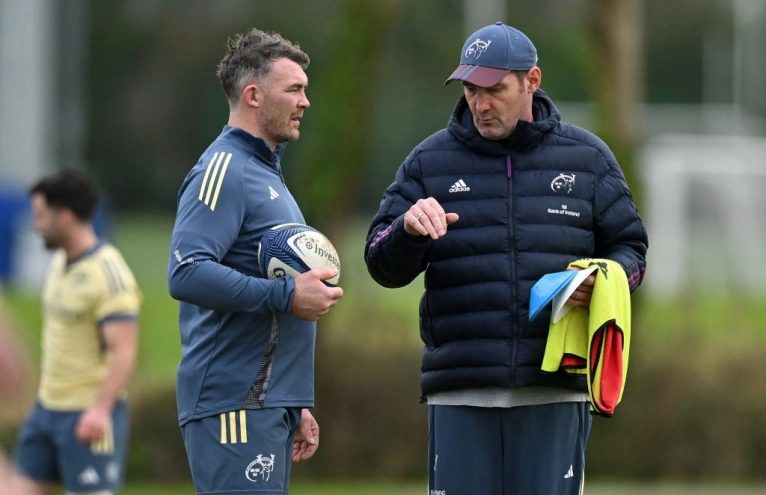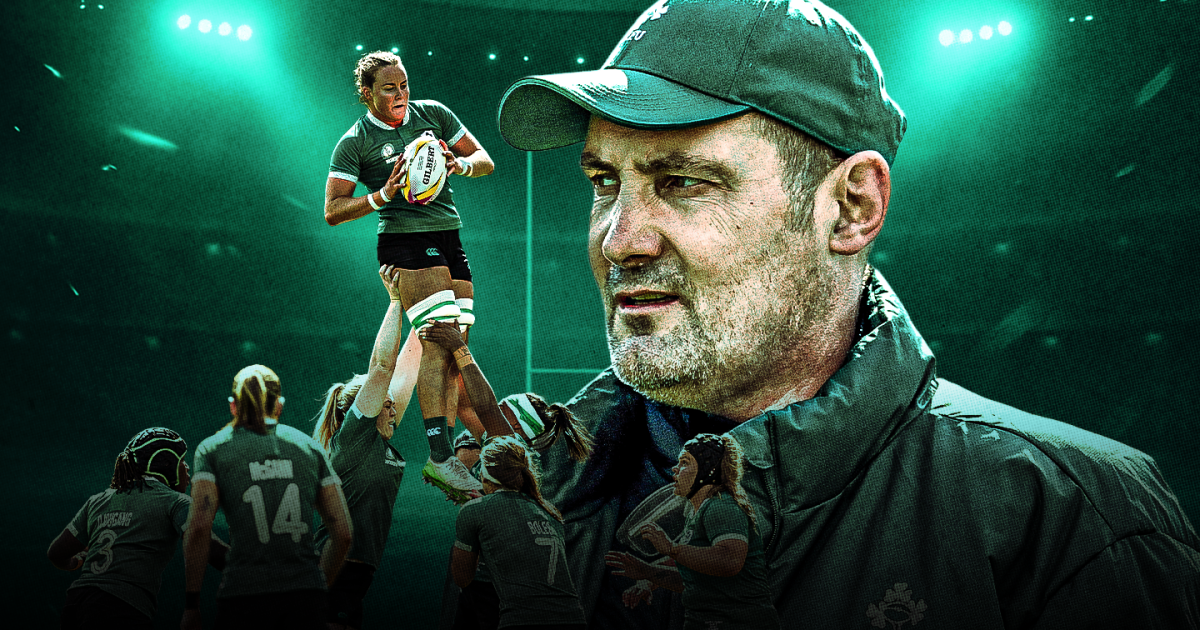It’s well-documented that Alex Codling is ‘obsessed’ with line outs.
In fact – it’s almost as well-documented as the 3,500 of them he stores on his now-infamous ‘jukebox’: a meticulously-categorised library of the things – delineated according to formation, outcome, delivery, options elsewhere on the field, and a host of other criteria. He coded it himself, and is grateful every day for how much easier it makes his craft than the VHS tapes he used to collect.
Between the cap – perched a good 6’5 from the floor – and the thick silver chain he wears: the cogs are always whirring. “Every minute of every day”, Codling is navigating a lifelong game of battleships, “a fascinating tactical and technical battle”- up against opposition set piece, current and future.
 Eimear Corri Fallon” width=”1024″ height=”683″ /> Ireland’s lock Eimear Corri Fallon claims the ball from a line out during the Women’s Rugby World Cup pool C match between Ireland and Spain at Franklin’s Gardens, Northampton, central England, on August 31, 2025. (Photo by Glyn KIRK / AFP) (Photo by GLYN KIRK/AFP via Getty Images)
Eimear Corri Fallon” width=”1024″ height=”683″ /> Ireland’s lock Eimear Corri Fallon claims the ball from a line out during the Women’s Rugby World Cup pool C match between Ireland and Spain at Franklin’s Gardens, Northampton, central England, on August 31, 2025. (Photo by Glyn KIRK / AFP) (Photo by GLYN KIRK/AFP via Getty Images) Portia Woodman-Wickliffe receives Women’s Top 50 award
Portia Woodman-Wickliffe receives Women’s Top 50 award
New Zealand Women’s superstar Portia Woodman-Wickliffe spoke to RugbyPass after receiving the prestigious, inaugural RugbyPass Women’s Top 50 award this week.
 Portia Woodman-Wickliffe receives Women’s Top 50 award
Portia Woodman-Wickliffe receives Women’s Top 50 award
New Zealand Women’s superstar Portia Woodman-Wickliffe spoke to RugbyPass after receiving the prestigious, inaugural RugbyPass Women’s Top 50 award this week.
“You’re looking for opportunities of your own, whilst pre-empting how they’re trying to exploit you – and with so many variables. Lifts, jumps, throws, the connection between the nine and backs – and what’s coming your way across the gap.
“There’s a massive amount to unpick, and I genuinely believe it’s why I’m on the planet. The obsession’s got worse and worse.” He chuckles from the sofa we’re perched on at Ireland’s team base, and checks himself. “Perhaps I should say stronger and stronger.”
Infatuation – fixation – is no bad thing: “passion can be infectious, and that’s how you help players get better.”
The reigning champions’ grins grew wider and scores more outlandish, as they surfed stylishly home on the underdogs’ own green wave.
Given that Ireland’s line out functioned at 61% during the Six Nations before his arrival, was up to 86 the following year, and has remained at that level so far in this World Cup (they’ve also managed three steals) – it’s safe to say he’s done exactly that.
In fact – if you discount the “little wobble around our process” the girls in green suffered in their opener – it’s tracking at 92%, and their ability to tighten things up in just a week post-Japan was immensely satisfying for all involved.
Had their trick play – moments after that hackle-raising Haka stare-down in Brighton – come to fruition, you have to wonder how differently things might have played out against the Black Ferns. As it was, we witnessed 80 attritional, leg-sapping and confidence-bruising minutes – Ireland asking the same questions over and over without a solution to be found – whilst the reigning champions’ grins grew wider and scores more outlandish, as they surfed stylishly home on the underdogs’ own green wave.
The clash had been billed as the pick of the pool stage: a rematch of that fever-pitch WXV battle royale – in which emerald trumped black courtesy of two late points in off the sticks and unquantifiable grit. What was delivered was a robust reminder of the fact that you can’t win a rugby match going backwards, and even fairytales require a certain amount of world class muscle.
Never once does Codling use Ireland’s injury list as an excuse, but – when he enthuses about their big-name absentees – Sunday makes a little more sense.
Dorothy Wall has “become one of the best line out callers in the game,” Erin King is “a simply incredible athlete,” and Aoife Wafer is “a complete player and person: diligent, caring, and with an instinctive understanding of all the little pieces required to be a professional.”
 CORK, IRELAND: APRIL 12: Dorothy Wall #5 of Ireland wins a line out during the Ireland V England, Women’s Six Nations Rugby match at Virgin Media Park on April 12th, 2025, in Cork, Ireland. (Photo by Tim Clayton/Corbis via Getty Images)
CORK, IRELAND: APRIL 12: Dorothy Wall #5 of Ireland wins a line out during the Ireland V England, Women’s Six Nations Rugby match at Virgin Media Park on April 12th, 2025, in Cork, Ireland. (Photo by Tim Clayton/Corbis via Getty Images)
They’re individuals “with moments in them to win games on their own,” and – right as they were ruled out of this World Cup – figures just as talismanic scythed their way from sevens into 15s down in the Land of the Long White Cloud. The team sheets were drastically different to last September, and so was the outcome.
“They’re big losses, and were really looking forward to this tournament. Fortunately – their time will come again, and – with their loss – comes opportunity for others.” He name checks the “exceptional” Fiona Tuite, the impact of both co-captains – Edel McMahon and Sam Monaghan – upon their return from injury, and the ferocious, standards-driving competition between Neve Jones and Cliodhna Moloney-MacDonald.
Commentating on each of Ireland’s pool stage matches has provided an ample window within which to ask players about their towering but softly-spoken line out guru – and the warmth which comes back instantaneously tells you all you need to know.
When you spend as much time together as we do, you can’t allow things to become too serious or regimented: that’s a waste of energy. When we’re on: we’re on. When we’re not: it’s important to relax, and have a bit of crack.
“He’s always joking – you never know what Codders is going to say next,” Claire Boles laughs. “Until it’s about line outs, and then he keeps the messaging so simple. He’s honest, he’s collaborative, he’s creative – and we really appreciate all of that.”
It was an inauspicious start – he got players’ names wrong in his very first meeting – but, fortunately, the wise cracking Londoner is quicker than anyone to scoff at himself, and has enjoyed the last year as much as his charges.
“When you spend as much time together as we do, you can’t allow things to become too serious or regimented: that’s a waste of energy. When we’re on: we’re on. When we’re not: it’s important to relax, and have a bit of crack.”
He clearly believes this on a human, emotional level, but adds – still speaking at the sort of speed usually reserved for Amee-Leigh Costigan in full flight – that there are reams of cognitive behavioural studies to prove that people take on information better when in a positive mindset. It’s becoming increasingly apparent that there are few people in the game more cerebral than Codling.
“I try to be authentic,” he adds, “and not change who I am based on the environment I’m going into. I’d not coached women before, but I went in with the same mindset as I would anywhere, and just got to know them as people: who they are, how they learn, and how they handle different situations.”
This part could’ve been written before our conversation took place. The biggest contrast between men and women? The number of questions, of course.
“They take everything literally, and are so keen to learn. If men have a bad session, they forget about it and get on with their lives – whereas this group need clarity and confidence.”
 Limerick , Ireland – 14 January 2025; Peter O’Mahony, left, with forwards coach consultant Alex Codling during a Munster Rugby squad training at the University of Limerick in Limerick. (Photo By Brendan Moran/Sportsfile via Getty Images)
Limerick , Ireland – 14 January 2025; Peter O’Mahony, left, with forwards coach consultant Alex Codling during a Munster Rugby squad training at the University of Limerick in Limerick. (Photo By Brendan Moran/Sportsfile via Getty Images)
So, whilst their World Cup build-up has included a real focus on the ability to adapt and improvise – “rather than have a conversation about it, when you can’t change any outcomes, on a Monday” – he still invests swathes of time into reviews, and contextualising process. No doubt, post-Black Ferns, it’s been a busy week already.
Somehow, around the analysis, the Mickey-taking, and the inventive sessions featuring fishing nets and various objects to hit with darts – Codling’s been switching hats, and from national green to Munster’s provincial red – where he’s been a forwards consultant since November.
The girls are more inquisitive, but both groups are “tight-knit, and immensely driven to get better” – and he’s been astonished by how many drills and ambitious plays he’s been able to execute with them. He uses clips of the women in his sessions with the men, and visa versa – which has only reaffirmed his mantra “to push them hard.”
“I’ll be very honest: I never thought we’d do half the stuff we’ve done, and that’s a credit to them – and how they’ve embraced every challenge. I’ve really stretched them, and they’ve just flown.”
He points to their rocket from tenth to fifth in the world in just 12 months, whilst taking care to note that they’ve not hit their straps yet.
“We’re a young group – in terms of life itself, and in our professional rugby lives,” and their meteoric ascent comes with pressure they’re still learning to handle. Sunday will be a first World Cup quarter final for every single member of the squad, and – for all the talk of how they want the expectation and exposure which comes with building their ‘Green Wave’ – it’ll be the sternest test of many of their careers to date.
The game is growing exponentially, and I’d definitely look to come back. I’ve loved every minute – and always talk about this group with a massive smile on my face
Head coach Scott Bemand has pointedly discussed Ireland’s tournament as a six-game campaign – aka one which culminates in Twickenham – but, whether he has one, two, or three match days remaining with this group, Codling is determined to cherish every moment, before he and his jukebox turn their undivided attention to Munster, where he’ll be their new, full-time forwards coach – and tasked with spinning slightly fewer plates.
“It’s been a mad few months, and I probably wouldn’t repeat it,’ he admits. It’s perhaps an “au revoir”, though – as opposed to a “goodbye”.
“The game is growing exponentially, and I’d definitely look to come back. I’ve loved every minute – and always talk about this group with a massive smile on my face,” he says – having proven his own point for the past 20 minutes. As if to underline things further, Denis Fogarty and Neve Jones wander past, and things are briefly – and entertainingly – derailed.
“I always want to leave the jersey in a better place,” Codling continues – turning back – “and to have an impact on people on and off the field.
That’s been a two-way street in this job: we’ve experienced so much, faced such challenges, had a load of laughs, and grown together along the way.”

